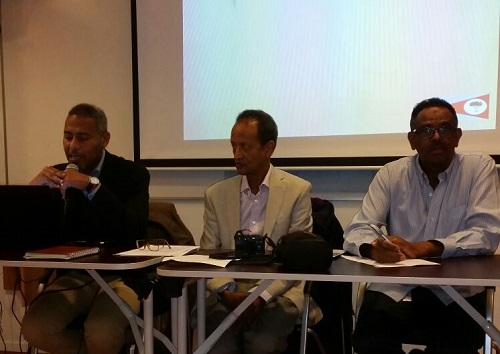Stockholm Seminar Report
By EFDM- Sweden Branch
The Eritrean Federal Democratic Movement has conducted a public open seminar for the Eritrean Forces for democratic change in Stockholm on 19th, Saturday 2015 at the Kista Hall in the afternoon and has held it up to seven in the evening.
The theme of the seminar was , Dialogue for Democratic change in Eritrea”
At the opening of the seminar , Mr. Idrissay Mohammed Osman, chairman of the EFDM legislative body welcomed the audiences and presented the aim and motivation of the seminar and the different topics the seminar will discuss. The first speaker was Mr. Salih Sabah vice- chairman of the EFDM Executive body.
Mr. Salih presented his paper on the past political historical revolution of the Eritrean people and the path towards the Eritrean nationhood, He focused and stressed more on the present political situation of the Eritrean Opposition forces by presenting his explanations by using power point. He stressed more on the internal external weaknesses of the opposition. He has also mentioned the strengths by bringing the building of the alliances and coalitions since 1999. He exemplified his speech by football players and the expectors. If the football players show good play then the football will be more attractive and people will come and participate. He means that the Eritrean Opposition lacks players. He concluded his papers by bringing an anecdote that we are in a deep dark hole we couldn’t get out of it.
The second speaker was Fesseha Nair, EFDM Executive member of the strategic studies of federal democracy,
Nair presented his paper under the title: ”
Eritrea Towards the Future” His presentation was based on identifying the deep rooted conflict and its past experience of conflict management
Focused on the following points:
- Historical
- -under political struggle
- Inder armed struggle
- Post independence EritreaDefining the Eritrean Internal Conflict
- Deep-rooted conflict
- – Characterization
- – Experience of conflict management in Eritrea
- – Partition
- – Negotiated settlement
- conflicts in the Eritrean politics and the undemocratic methods of conflict managements and their consequences
Post-dictatorship Eritrea – Transitional period and its challengs
Laying foundation of the democratic constitutional Eritrea after the fall of dictatorship
-Threats of a new dictatorship
- Blockning coups
- Constitution draftingDemocracy and Conflict Management
- -Resoultion
- Removal or end of Dictatorship
- Management or reparations of the harms committed by the past dictatorship
- Non- violent transition
- Positive and constructive handlings of difference and divergence
- A Democratic defense policy
- – A meritorious responsibility
- Formation of state building/ nation building
- Multiculturalism and its management
His presentation was by power -point and short focusing on the period of transition and the challenges that can face the opposition. He stressed that the present struggle from dictatorship to democracy is not only to end the dictatorship but preparing the future. in his presentation he referred many institutions and scholars contributions like Prof. Huntington, Gene Sharp and many others that has provided the skills and knowledge in the struggle from dictatorship to democracy. He concluded his paper that the federal democratic decentralized constitution is the best constitution that can accommodate any multicultural society regardless their geographical size and number of population.
Questions and answers session
More time was provided to the audiences to participate in the issues raised on the seminar.
Constructive questions were raised by the participants. More questions were pointed to the leadership of the EFDM, its weaknesses and not reaching the mass by its thoughts of federalism in Eritrea. More important were the questions why the opposition forces couldn’t join its efforts and shorten the time of the struggle against the dictatorship. Some also suggested and asked the importance of trust building.
Concluding Remarks
The Seminar participants were satisfied by the seminar and recommended that such platforms with the people must be conducted in all the towns and cities of Sweden in the future. Such seminars can consolidate the working relationship between the political and civic organizations and the people in general.
Short URL: https://english.farajat.net/?p=10043
















